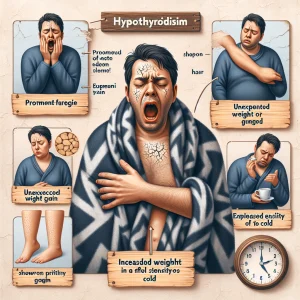Recognize and Comprehend the Critical Signs and Symptoms of Hypothyroidism
Hypothyroidism is a significant health condition that arises when the thyroid gland does not produce enough essential thyroid hormones necessary for optimal bodily functions. This butterfly-shaped gland, located at the front of the neck, plays a crucial role in regulating various processes within the body, including metabolism, energy levels, and overall health. When the thyroid is underactive, it can initiate a cascade of physiological changes that can affect almost every system in the body. The two main hormones—thyroxine (T4) and triiodothyronine (T3)—are vital for maintaining a healthy metabolic rate. A decline in their production can lead to significant decreases in energy, fluctuations in weight, and an overall decline in well-being, underscoring the necessity of recognizing and understanding the extensive implications of this condition.
Various factors can lead to the onset of hypothyroidism, including autoimmune disorders like Hashimoto’s thyroiditis, specific medications, prior radiation treatments, or even an inadequate intake of iodine. Being informed about the risk factors and symptoms linked to hypothyroidism is essential, as it can substantially influence your health and quality of life. Often referred to as the body's “metabolic engine,” a decline in thyroid function results in metabolic disruptions, which may present as weight gain, chronic fatigue, and other distressing symptoms. It is important to note that hypothyroidism is more commonly diagnosed in women and tends to increase with age. Being aware of these signs and symptoms enables you to pursue timely medical intervention and explore suitable treatment options.
In-Depth Insights and Information Regarding Hypothyroidism
- Hypothyroidism is defined by a deficiency in hormone production from the thyroid gland, leading to a wide array of physical and psychological symptoms.
- Typical signs of hypothyroidism include fatigue, weight gain, dry skin, and increased sensitivity to cold, among others.
- Physical manifestations may also include hair loss, joint pain, and muscle weakness, all of which can significantly disrupt daily activities and lifestyle.
- The emotional and psychological repercussions can encompass depression, anxiety, and challenges with focus and concentration, potentially exacerbating mental health issues.
- Recognizing hypothyroidism in children and adolescents can be particularly challenging, as they may show signs like growth delays, delayed puberty, or difficulties in academic performance.
- The diagnostic process often includes blood tests that assess levels of thyroid hormones and Thyroid-Stimulating Hormone (TSH).
- Standard treatments for hypothyroidism generally consist of synthetic thyroid hormone medications designed to compensate for insufficient hormone production.
- Incorporating lifestyle modifications such as a nutritious diet, regular exercise, effective stress management, and prioritizing restful sleep can significantly enhance the management of hypothyroidism.
 Identifying the Common Symptoms of Hypothyroidism in Everyday Life
Identifying the Common Symptoms of Hypothyroidism in Everyday Life
While navigating through your daily activities, various symptoms may emerge that could indicate an underactive thyroid. A frequent complaint from individuals suffering from hypothyroidism is an overwhelming sense of fatigue. Many individuals report feeling excessively tired, even after a full night’s sleep, which can significantly diminish motivation and hinder daily tasks. This unrelenting exhaustion not only affects physical health but also impacts emotional stability and overall productivity, leading to frustration and potential health complications.
In addition to fatigue, unexpected weight gain is another prevalent symptom. Many people may notice an increase in body weight despite adhering to a healthy diet and regular exercise regimen. This frustrating weight gain is often a result of a slowed metabolism caused by reduced thyroid hormone levels. Other associated symptoms can include heightened sensitivity to cold, dry skin, hair loss, and constipation. Recognizing these early indicators is vital, as it allows for prompt medical assessment and effective management of the condition.
Exploring the Physical Symptoms Associated with Hypothyroidism
The physical symptoms linked to hypothyroidism can vary significantly and impact your daily life in profound ways. One of the most frequently noticed signs is a distinct change in skin and hair health. Many individuals report experiencing dry, rough, and flaky skin that can be quite uncomfortable. Hair may also become brittle and prone to falling out more easily, leading to concerns regarding personal appearance and self-esteem, which can further exacerbate mental health challenges.
Another physical indication to be vigilant about is myxedema, characterized by swelling, particularly in the facial area or around the eyes. This condition arises from the accumulation of mucopolysaccharides in the skin, resulting in a puffy appearance that can be distressing. Additionally, muscle weakness and joint pain are common issues faced by those diagnosed with hypothyroidism. The discomfort and stiffness in muscles and joints can severely limit participation in previously enjoyable activities. Therefore, recognizing these physical manifestations is critical for understanding the broader implications of hypothyroidism on your body and overall quality of life.
Examining the Emotional and Mental Health Effects of Hypothyroidism
Hypothyroidism not only adversely affects physical health but also has a significant impact on emotional and mental well-being. Numerous individuals grappling with this condition frequently experience feelings of depression or heightened anxiety that seem disproportionate relative to their life situations. You may find yourself struggling with persistent sadness or a lack of motivation without any clear reason. If these feelings continue unabated, they can become particularly concerning and indicative of the condition's deeper consequences on mental health.
Cognitive abilities are also often affected, with many reporting symptoms resembling “brain fog.” This cognitive decline is typically characterized by difficulties in concentration, forgetfulness, and an overall sense of mental sluggishness. Such issues can interfere with daily responsibilities, making it increasingly challenging to manage tasks at work and home. Recognizing these emotional and mental symptoms associated with hypothyroidism is essential for seeking the appropriate support and treatment necessary to enhance your overall quality of life.
 Recognizing Hypothyroidism Symptoms in Children and Adolescents
Recognizing Hypothyroidism Symptoms in Children and Adolescents
Hypothyroidism is not exclusively an adult condition; it can also significantly impact children and adolescents, often presenting differently than in adults. In younger individuals, symptoms may not always be immediately recognizable. For instance, you might notice signs such as growth delays or challenges focusing in school. These indicators can easily be misinterpreted as typical childhood behavior or common developmental delays, making it imperative for parents and guardians to remain vigilant and proactive in monitoring their children’s health.
Beyond growth-related issues, children diagnosed with hypothyroidism may also experience excessive fatigue or lethargy, which can markedly affect their ability to engage in physical activities and socialize with peers. Mood swings and irritability are commonly observed as well, as hormonal imbalances disrupt emotional regulation. If you suspect your child is displaying symptoms suggestive of hypothyroidism, it is crucial to consult with a healthcare professional for thorough evaluation and testing, ensuring their health and developmental trajectory are appropriately supported.
Understanding the Significance of Thyroid Function Tests in Diagnosing Hypothyroidism
The Essential Role of Thyroid Function Tests in Accurate Diagnosis
The path to diagnosing hypothyroidism typically begins with thyroid function tests, which are essential for evaluating the health of your thyroid gland. The most commonly conducted tests assess levels of Thyroid-Stimulating Hormone (TSH) and free thyroxine (T4). The pituitary gland is responsible for producing TSH, which is critical for signaling the thyroid to produce T4. When TSH levels are elevated, it can indicate that the thyroid is underactive and struggling to produce sufficient hormones, suggesting the possibility of hypothyroidism.
Interpreting Thyroid Test Results for Effective Diagnosis
Simultaneously, evaluating T4 levels is crucial to understanding the degree of hormonal deficiency. When blood tests reveal elevated TSH levels coupled with low T4 levels, this combination typically confirms a diagnosis of hypothyroidism. Understanding the intricacies of these tests can help alleviate concerns and provide clarity regarding your thyroid health, empowering you to take informed steps toward treatment.
Empowering Yourself with Knowledge About the Diagnostic Process
Enhancing your understanding of the diagnostic process not only broadens your knowledge base but also empowers you as you navigate your health journey. Being informed about how thyroid function tests operate and what they reveal about your body fosters more effective discussions with your healthcare provider, enabling proactive management of your health and well-being.
 Exploring Comprehensive Treatment Options for Effective Hypothyroidism Management
Exploring Comprehensive Treatment Options for Effective Hypothyroidism Management
Once you receive a diagnosis of hypothyroidism, a variety of treatment options are available to assist you in managing the condition effectively. The most commonly employed approach is hormone replacement therapy, typically utilizing synthetic levothyroxine. This medication is designed to mimic the natural function of thyroid hormones, aiding in the restoration of normal hormone levels, alleviation of symptoms, and overall improvement in well-being.
Your healthcare provider will work closely with you to determine the appropriate dosage tailored to your specific needs and how your body responds to the treatment. Regular monitoring through blood tests is essential to ensure that your hormone levels remain within the target range. Maintaining open communication with your healthcare team regarding any changes in your symptoms or potential side effects is vital for optimizing your treatment experience and achieving the best possible health outcomes.
Implementing Lifestyle Changes for Optimal Management of Hypothyroidism
In addition to medication, adopting specific lifestyle changes can significantly enhance your ability to manage hypothyroidism effectively. A balanced diet that emphasizes whole foods can be beneficial for supporting thyroid function and overall health. Including foods rich in iodine, selenium, and zinc—such as fish, nuts, seeds, and leafy greens—can provide essential nutrients necessary for optimal thyroid performance and hormone production.
Moreover, engaging in regular physical activity is crucial for maintaining a healthy weight and boosting energy levels. Moderate exercise can help counteract fatigue, uplift mood, and enhance cognitive function, thereby contributing to an overall sense of well-being. Prioritizing good sleep hygiene is equally important; aiming for 7-9 hours of quality sleep each night supports hormonal balance and overall health.
By understanding hypothyroidism and its impact on both physical and emotional health, you empower yourself to take charge of your well-being. With the right approach to diagnosis, consistent management, treatment options, and lifestyle modifications, you can navigate this condition with confidence. Remember, you are not alone on this journey; seeking support from healthcare professionals and loved ones can significantly enhance your path toward achieving optimal health.
Frequently Asked Questions About Hypothyroidism
What are the most common symptoms linked to hypothyroidism?
Common symptoms associated with hypothyroidism include fatigue, weight gain, constipation, dry skin, hair loss, sensitivity to cold, muscle weakness, and depression.
Can hypothyroidism affect menstrual cycle regularity?
Yes, hypothyroidism can indeed lead to irregularities in the menstrual cycle, which may present as missed periods, heavy bleeding, or other cycle disruptions.
Is hair loss a common symptom of hypothyroidism?
Hair loss is a frequent symptom of hypothyroidism, often manifesting as thinning hair, brittle strands, or noticeable bald patches.
Can hypothyroidism contribute to weight gain?
Yes, hypothyroidism can result in weight gain due to a decreased metabolic rate and potential fluid retention in the body.
What mental health issues are associated with hypothyroidism?
Mental health symptoms related to hypothyroidism may include depression, anxiety, irritability, and difficulties with concentration.
Can hypothyroidism cause muscle weakness?
Yes, individuals with hypothyroidism often experience muscle weakness and discomfort, which can impede daily activities and exercise routines.
Is cold sensitivity a prevalent symptom of hypothyroidism?
Yes, experiencing sensitivity to cold is a common symptom of hypothyroidism, often associated with a lower basal metabolic rate and reduced heat production in the body.
Can hypothyroidism lead to dry skin?
Yes, hypothyroidism can result in dry and itchy skin due to reduced oil production and sweating, leading to discomfort and irritation.
Presented BY: Hypothyroid Blood Tests
Hypothyroidism Symptoms: Key Signs to Recognise Was First Published By https://bloodtest.co.uk
Find Us On Facebook: EZ Blood Tests
The Article: Hypothyroidism Symptoms: Essential Signs to Identify appeared first on: https://ezbloodtest.com
The Article Hypothyroidism Symptoms: Key Signs You Should Recognize Was Found On https://limitsofstrategy.com


I appreciate your insights on hypothyroidism and the essential role the thyroid gland plays in our overall health. It’s fascinating yet alarming how something as small as this butterfly-shaped gland can significantly impact our metabolism and energy levels. I remember when a close friend was diagnosed with hypothyroidism; it was eye-opening to see how the condition affected not only her physical health but also her mental well-being. The fatigue and weight fluctuations she experienced were just a few of the challenges that made everyday life difficult.